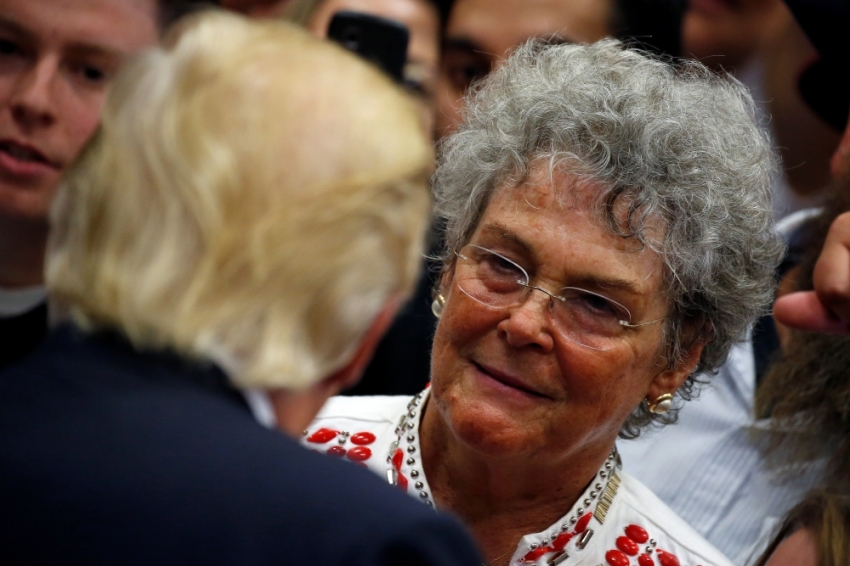Was Trump's rise driven by church decline?

The decline of Christianity in the U.S. helped President Donald Trump secure the Republican nomination, an analysis argues.
"The best way to describe Trump’s support in the Republican primaries — when he was running against the likes of Jeb Bush, Ted Cruz, Marco Rubio, John Kasich — would be: white evangelicals who do not go to church," Timothy Carney wrote Jan. 17 for The American Conservative.
Using Voter Study Group data, Carney found that Trump did best among Republican primary voters who seldom or never attend religious services.
Carney, opinion editor for The Washington Examiner and a visiting fellow at the American Enterprise Institute, also writes about this topic in the forthcoming Alienated America: Why Some Places Thrive While Others Collapse, which will be published Feb. 19.
Carney doesn't place the blame on working-class whites who stopped going to church, but sees it as a complicated story of economic decline contributing to church closures.
"Economic collapse goes hand in hand with the desiccation of religious institutions," Carney wrote. "When factories or coal mines close, some portion of the population flees. Still others stop going to church ....
"Absent strong job prospects, fewer adults form families. When people have fewer weddings and christenings, and fewer kids to educate on right and wrong, they go to church less. Of course then, this becomes a vicious circle: in communities less anchored in church, there’s less family formation. A place with fewer families is a place less attractive to employers — thus this social and moral collapse is both a consequence and a cause of economic collapse.
"The 'economic anxiety' is inextricably tied with the collapse of church and family. The latter is the more dangerous problem."
Carney concluded by noting the "bitter irony" of church decline leading to Trump, for those on the secular Left who believe a less religious nation is a better nation.
Others have also argued that the rise of Trump is a symptom of the decline of religion in America.
In a Dec. 7 column for New York magazine, columnist Andrew Sullivan wrote that the void left by religion is being filled by both Trump and illiberal social justice warriors.
“We have the cult of Trump on the right, a demigod who, among his worshipers, can do no wrong. And we have the cult of social justice on the left, a religion whose followers show the same zeal as any born-again evangelical. They are filling the void that Christianity once owned, without any of the wisdom and culture and restraint that Christianity once provided,” Sullivan said.
Others have similarly argued that Trump's strongest support doesn't come from his most religious voters. Carney cited Notre Dame professor Geoffrey Layman, who made this argument in a Washington Post op-ed, "Where is Trump’s evangelical base? Not in church," during the 2016 nomination contests.
Some reacted to Carney's column by pointing out that even if dispossessed Christians fueled Trump's rise, devout white evangelicals were still responsible for getting him over the finish line. Plus, some of Trump's strongest supporters continue to be evangelical leaders, such as Pastor Robert Jeffress, the Rev. Franklin Graham, and Liberty University President Jerry Fallwell Jr.
In response to Carney's argument, Eastern Illinois University political scientist Ryan Burge wrote for Religion in Public that Republican voters who went to church the most often mostly supported Texas Sen. Ted Cruz. They only represented 20 percent of the sample, however, and every other church attendance category mostly backed Trump. Burge also found that Cruz supporters were the most conservative on Christian Right issues, such as religious freedom, abortion and homosexuality. But beyond those issues, Cruz voters looked similar to Trump voters.
In a Tuesday column for Religion & Politics, Janelle Wong, professor of American studies and Asian American studies at the University of Maryland, wrote that evangelical support for Trump is more driven by race than religion. Noting data first reported in her book, Immigrants, Evangelicals, and Politics in an Era of Demographic Change (2018), Wong wrote that Trump had higher support from nonevangelical whites than evangelical non-whites, suggesting that white evangelical Trump supporters are more driven by their whiteness than their evangelicalism.
Carney and Wong both agree that economics alone doesn't fully explain the source of Trump's strongest supporters.
"It’s pretty clear at this point that economic disenfranchisement is not the driving force behind white evangelicals’ conservative politics. Rather, the primary driver in my view is a sense of 'racial embattlement,'" Wong concluded.
More evidence for this was in a September 2018 report by Emily Ekins for The Cato Institute (using the same dataset Carney used), which found that nonreligious Trump voters showed more racist attitudes than religious Trump voters.
In explaining Trumpism, Carney points to a loss of religious instruction and Wong points to racist sentiments. But these theories can be complementary if racism thrives where religious instruction dwindles.
A recent book by political scientists Ruth Melkonian-Hoover and Lyman Kellstedt found that white evangelicals who are theologically conservative and are active in their church are more likely to disagree with Trump on immigration issues, which suggests that a combination of participation and belief, church attendance and instruction can influence political views, and not always in the popularly expected direction.



























